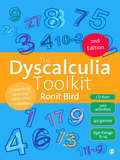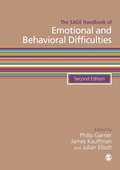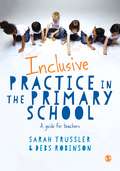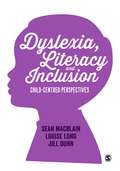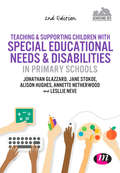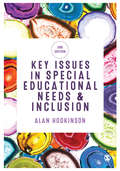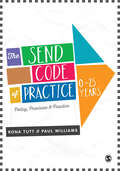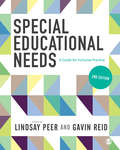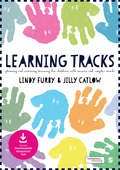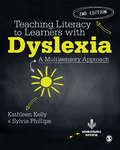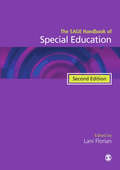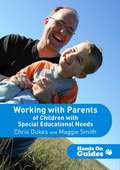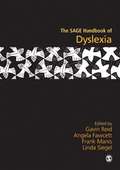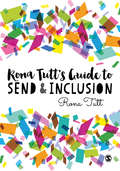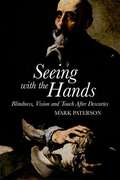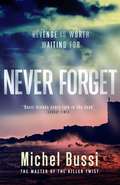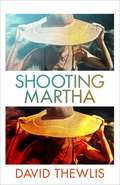- Table View
- List View
The Dyscalculia Toolkit
by Ronit BirdWith over 200 activities and 40 games this book is designed to support learners aged 6 to 14 years, who have difficulty with maths and numbers. Ronit Bird provides a clear explanation of dyscalculia, and presents the resources in a straightforward fashion.<P><P> New to this second edition:<P> - even more activities, games and printable resources <P> - additional material, provided on the easily accessible CD-ROM<P> - a table indicating which difficulties are supported by which activities<P> - material that caters for a wider range of abilities and ages.<P> This book and accompanying CD meet the needs of specialist and non-specialist teachers who are working with learners with difficulties in maths in mainstream settings. It is equally useful as a resource to recommend to parents who want to support their children's learning.
The SAGE Handbook of Emotional and Behavioral Difficulties
by James Kauffman Professor Julian Elliot Professor Philip Garner'This important revision with updated material will inform professionals, students, and the interested public of evolving international perspectives on EBD. New chapters consider causation, the influence and role of social contexts and social support, ADHD, teacher knowledge and parental engagement. The new content presents us with fresh ideas and approaches.' - Katherine Bilton, University of Alaska, USA This new edition of The Handbook of Emotional and Behavioural Difficulties, first published in 2004, has been completely reworked and refreshed by a new editorial team led by Philip Garner. A thorough revision of existing content, together with new material, bring the volume firmly up-to-date, and offers guidance and recommendations for future research and practice. Covering a range of important issues in EBD, chapters are organized into five main parts: Contexts, Definitions and Terminologies Roots, Causes and Allegiances Strategies and Interventions Training and Professional Development Enhancement EBD Futures - Challenges and Opportunities With an impressive array of UK, US and other international contributors, the Handbook will be indispensable for undergraduate and Master's level students pursing Teacher Training, Educational and Developmental Psychology and Special Education courses. It will also be valuable to social workers, counsellors, school (educational) psychologists and other practitioners in relevant fields.
Inclusive Practice in the Primary School: A Guide for Teachers
by Sarah Trussler Debs RobinsonDo you want to feel more confident when teaching children with Special Educational Needs and Disabilities (SEND)? Would you like to be a more inclusive teacher? This book provides clear and flexible frameworks for effective inclusive teaching, and explains how to teach and plan for supporting any child's learning, no matter what their needs are. With case studies and activities the book: explains and contextualizes current beliefs towards SEN provides models for practice encourages you to engage in thinking about SEN and inclusion offers interactive reflection points throughout links out to research with suggestions for further reading Whether you're training to be a primary school teacher or already in the classroom this book will make you feel confident to be the inclusive teacher you need to be.
Inclusive Practice in the Primary School: A Guide for Teachers
by Sarah Trussler Debs RobinsonDo you want to feel more confident when teaching children with Special Educational Needs and Disabilities (SEND)? Would you like to be a more inclusive teacher? This book provides clear and flexible frameworks for effective inclusive teaching, and explains how to teach and plan for supporting any child’s learning, no matter what their needs are. With case studies and activities the book: explains and contextualizes current beliefs towards SEN provides models for practice encourages you to engage in thinking about SEN and inclusion offers interactive reflection points throughout links out to research with suggestions for further reading Whether you’re training to be a primary school teacher or already in the classroom this book will make you feel confident to be the inclusive teacher you need to be.
Dyslexia, Literacy and Inclusion: Child-centred perspectives
by Sean Macblain Dr Jill Dunn Louise LongThis book is about raising standards in literacy for children with dyslexia by putting the child at the centre of everything you do, focusing on wellbeing, and recognising the role that adults have to play in ensuring all children reach their potential. Concentrating on children in primary schools and early years settings the book looks at: Early intervention Pupil voice Working as a team New literacies Child-centred identification, assessment and provision Challenges for the inclusive school. Suitable for all those working with children with dyslexia this book contains strategies that can be easily adopted to academically and emotionally benefit the children you are working with.
Dyslexia, Literacy and Inclusion: Child-centred perspectives
by Sean MacBlain Louise Long Dr Jill DunnThis book is about raising standards in literacy for children with dyslexia by putting the child at the centre of everything you do, focusing on wellbeing, and recognising the role that adults have to play in ensuring all children reach their potential. Concentrating on children in primary schools and early years settings the book looks at: Early intervention Pupil voice Working as a team New literacies Child-centred identification, assessment and provision Challenges for the inclusive school. Suitable for all those working with children with dyslexia this book contains strategies that can be easily adopted to academically and emotionally benefit the children you are working with.
Teaching and Supporting Children with Special Educational Needs and Disabilities in Primary Schools (Achieving QTS Series)
by Jonathan Glazzard Alison Hughes Annette Netherwood Lesley Neve Jane StokoeIf you are a primary trainee, or are training to support children in primary schools, this is your guide to working with children with Special Educational Needs and Disabilities (SEND). We begin by exploring what is meant by SEND in primary schools and go on to cover all you need to know about your statutory responsibilities in school. Current legislation and the Code of Conduct are covered, to give you lots of information about the content you will be working in. The book then examines the range of needs you will encounter in primary schools giving you details information and practical advice. This second edition has been fully restructured and updated to include a new section on the key theory relating to SEND. Exploring theories and theorist that you will need to know about to fully understand how to support children. Also new for this edition is a chapter focusing on the role of the SENCO in the primary school. Finally, the book includes more practical support to help you in the classroom. Checklists to help you to work comprehensively and information about useful resources and outside agencies.
Teaching and Supporting Children with Special Educational Needs and Disabilities in Primary Schools (Achieving QTS Series)
by Jonathan Glazzard Jane Stokoe Alison Hughes Annette Netherwood Lesley NeveIf you are a primary trainee, or are training to support children in primary schools, this is your guide to working with children with Special Educational Needs and Disabilities (SEND). We begin by exploring what is meant by SEND in primary schools and go on to cover all you need to know about your statutory responsibilities in school. Current legislation and the Code of Conduct are covered, to give you lots of information about the content you will be working in. The book then examines the range of needs you will encounter in primary schools giving you details information and practical advice. This second edition has been fully restructured and updated to include a new section on the key theory relating to SEND. Exploring theories and theorist that you will need to know about to fully understand how to support children. Also new for this edition is a chapter focusing on the role of the SENCO in the primary school. Finally, the book includes more practical support to help you in the classroom. Checklists to help you to work comprehensively and information about useful resources and outside agencies.
Key Issues in Special Educational Needs and Inclusion (Education Studies: Key Issues)
by Alan HodkinsonUnderstanding and engaging critically with the field of special educational needs and disability (SEND) is a difficult task. However, the new edition of this bestselling book continues to help students contextualize SEND in relation to historical, ideological and political developments as well as support them in developing a critical understanding of the complexities associated with inclusion. Completely up to date with recent legislation such as the SEND Code of Practice (2014) there are case studies, reflections and activities which will help students question practice they have seen and experienced. Covering the 0-25 age range this book is suitable for all those working with children and young people across education, health and social work.
The SEND Code of Practice 0-25 Years: Policy, Provision and Practice
by Paul Williams Rona TuttConsidering it for your course reading list? Lecturers can order their e-inspection copy here today! How have you found the changes brought about by the new SEND Code of Practice: 0-25 years (2014)? This book is the ultimate guide to making sure that you are not only meeting the requirements, but are improving outcomes for children and young people as well. Written for all professionals working in the field, it covers: · The broader Children and Families Act (2014) · The role of the local authority · Guidance on all the key changes that school leaders, SENCO's, and staff are concerned about · Case studies of settings across the 0-25 age range, including maintained schools, academies, free schools, and specialist and alternative provision. Whether you work in education, health, or social care, or are training to do so, this book will genuinely improve your provision and practice for children and young people with SEND.
The SEND Code of Practice 0-25 Years: Policy, Provision and Practice
by Paul Williams Rona TuttConsidering it for your course reading list? Lecturers can order their e-inspection copy here today! How have you found the changes brought about by the new SEND Code of Practice: 0-25 years (2014)? This book is the ultimate guide to making sure that you are not only meeting the requirements, but are improving outcomes for children and young people as well. Written for all professionals working in the field, it covers: · The broader Children and Families Act (2014) · The role of the local authority · Guidance on all the key changes that school leaders, SENCO's, and staff are concerned about · Case studies of settings across the 0-25 age range, including maintained schools, academies, free schools, and specialist and alternative provision. Whether you work in education, health, or social care, or are training to do so, this book will genuinely improve your provision and practice for children and young people with SEND.
Key Issues in Special Educational Needs and Inclusion (Education Studies: Key Issues)
by Alan HodkinsonUnderstanding and engaging critically with the field of special educational needs and disability (SEND) is a difficult task. However, the new edition of this bestselling book continues to help students contextualize SEND in relation to historical, ideological and political developments as well as support them in developing a critical understanding of the complexities associated with inclusion. Completely up to date with recent legislation such as the SEND Code of Practice (2014) there are case studies, reflections and activities which will help students question practice they have seen and experienced. Covering the 0-25 age range this book is suitable for all those working with children and young people across education, health and social work.
Special Educational Needs: A Guide for Inclusive Practice
by Gavin Reid Lindsay PeerCovering contemporary policy issues, perspectives from practice and a range of common syndromes and barriers Special Educational Needs presents a wealth of information and guidance for students and professionals on how to achieve effective, inclusive practice. Second edition features include: · fully revised annotated further readings and links to useful websites; · a new chapter on Autism and Applied Behaviour Analysis (ABA) · a new chapter on Down Syndrome · updated reference to legislation, including the SEND Code of Practice (2014) · updated case studies covering 0-18 age range This comprehensive course text is ideal for students, teachers, practitioners and specialists, and provides a solid foundation for understanding and supporting learners with additional needs.
Special Educational Needs: A Guide for Inclusive Practice
by Lindsay Peer Gavin ReidCovering contemporary policy issues, perspectives from practice and a range of common syndromes and barriers Special Educational Needs presents a wealth of information and guidance for students and professionals on how to achieve effective, inclusive practice. Second edition features include: · fully revised annotated further readings and links to useful websites; · a new chapter on Autism and Applied Behaviour Analysis (ABA) · a new chapter on Down Syndrome · updated reference to legislation, including the SEND Code of Practice (2014) · updated case studies covering 0-18 age range This comprehensive course text is ideal for students, teachers, practitioners and specialists, and provides a solid foundation for understanding and supporting learners with additional needs.
Learning Tracks: Planning and Assessing Learning for Children with Severe and Complex Needs
by Jilly Catlow Lindy FurbyLearning Tracks is a planning and tracking resource to support the planning and assessment of learning for children and young people with severe and complex learning disabilities. It was designed by the authors whilst teaching at a school for children and young people with severe and complex learning disabilities. This easy to use method is ready to implement in any setting to help assess children at the lowest levels of learning. It gives you, in a snapshot, where to focus your efforts with a class, a group or an individual child in order to help them progress in a meaningful way. At the very early stages of learning the steps that children and young people make can be small but incredibly significant for them and those that teach them. However, it can be problematic to evidence and formally recognise these achievements and plan next steps. Learning Tracks presents a framework to recognise achievement at these early levels and plan for progression through challenge, breadth and application. The Learning Tracks framework for recognising achievement at very early levels of learning: Can help teachers understand the way their children may be learning Offers a vocabulary for describing the learning Offers a structure for planning the learning
Learning Tracks: Planning and Assessing Learning for Children with Severe and Complex Needs
by Lindy Furby Jilly CatlowLearning Tracks is an assessment tool to support the planning and assessment of learning for children and young people with severe and complex learning disabilities (SCLD). It was designed by Lindy Furby and Jilly Catlow while teaching at St Crispin’s School for children and young people with severe and complex learning disabilities. At the very early stages of learning, the steps that children and young people make can be small but incredibly significant for them and those who teach them. However, it can be problematic to evidence and formally recognise these achievements and plan next steps. Learning Tracks presents a framework to recognise achievement at these early levels and plan for progression through challenge, breadth and application. The Learning Tracks framework for recognising achievement at very early levels of learning: Can help teachers understand the way their children may be learning Offers a vocabulary for describing the learning Offers a structure for planning the learning When you purchase Learning Tracks, you receive the book that introduces you to the framework and theories underpinning Learning Tracks, describes the curriculum included and demonstrates how it can be implemented in your setting. In addition to this book you will also receive access to the complete ready-made Learning Tracks assessment tool that can be downloaded online. This is available as a PDF with editable elements and a template you can personalise it to suit your individual needs.
Teaching Literacy to Learners with Dyslexia: A Multi-sensory Approach
by Kathleen Kelly Sylvia PhillipsThe second edition of this bestselling book provides a structured multi-sensory programme for teaching literacy to children and young people from 5-18 with dyslexia and other specific literacy difficulties. Supported by a wealth of resources available online and updated throughout, the new edition now includes a brand new section on Implementing the Accelerated Programme for learners who have already acquired some literacy skills. This includes: · A placement test to indicate whether the programme is appropriate · A diagnostic assessment procedure to determine where the learner should begin on the Accelerated Programme · Examples of lesson plans, reading cards and spelling cards to help teachers prepare resources for their students. With tried and tested strategies and activities this book continues to provide everything you need to help improve and develop the literacy skills of learners in your setting including; · the rationale for a structured multi-sensory approach · the development of phonological, reading, writing and spelling skills · working with learners who have English as an Additional Language (EAL) · lesson structure and lesson-planning · alphabet and dictionary skills · memory work and study skills · teaching the programme to groups · ideas for working with young children.
Teaching Literacy to Learners with Dyslexia: A Multi-sensory Approach
by Kathleen Kelly Sylvia PhillipsThe Second Edition of this bestselling book provides a structured multi-sensory programme for teaching literacy to children and young people from 5-18 with dyslexia and other specific literacy difficulties. Supported by a wealth of resources available online and updated throughout, the new edition now includes a brand new section on Implementing the Accelerated Programme for learners who have already acquired some literacy skills. This includes: A placement test to indicate whether the programme is appropriate A diagnostic assessment procedure to determine where the learner should begin on the Accelerated Programme Examples of lesson plans, reading cards and spelling cards to help teachers prepare resources for their students With tried and tested strategies and activities this book continues to provide everything you need to help improve and develop the literacy skills of learners in your setting including; the rationale for a structured multi-sensory approach the development of phonological, reading, writing and spelling skills working with learners who have English as an Additional Language (EAL) lesson structure and lesson-planning alphabet and dictionary skills memory work and study skills teaching the programme to groups ideas for working with young children.
The SAGE Handbook of Special Education: Two Volume Set
by Lani FlorianThe second edition of The SAGE Handbook of Special Education provides a comprehensive overview of special education, offering a wide range of views on key issues from all over the world. The contributors bring together up-to-date theory, research and innovations in practice, with an emphasis on future directions for the role of special education in a global context of inclusion. This brand new edition features: " New chapters on families, interagency collaboration and issues of lifelong learning " The UN Convention on the Rights of Persons with Disabilities " Policy reform proposals " Equity and social justice in education " The impact of new thinking on assessment " Issues and developments in classification " The preparation and qualifications that teachers need The Handbook's breadth, clarity and academic rigour will make it essential reading for researchers and postgraduate students, and also for practitioners, teachers, school managers and administrators.
Working with Parents of Children with Special Educational Needs (Hands on Guides)
by Maggie Smith Chris DukesIncludes CD-Rom `This very timely book...aims to support practitioners to work in partnership with parents, particularly those parents whose children have special or additional needs...It very clearly sets out the principles, legislative framework and processes which are essential knowledge for all SENCOs and managers in early years settings' - Early Years Update `The book has a positive approach to all aspects of working with parents and children...It's a book you can easily dip in and out of and is written in plain English...There aren't many textbooks I can read from cover to cover but this is one - I found it really interesting and enlightening. Score - 10 out of ten' - National Childminding Association `In short, this book provides almost everything you need in order to work successfully with parents' - Early Years Educator Are you looking for advice on how to work successfully with parents? Every practitioner knows that it is vitally important to work well with parents and make the relationship a positive and productive one, to ensure the best support for the child with special educational needs. This book offers clear strategies for ways to forge successful and lasting relationships with parents. It includes: - advice on working together with parents to improve the child's learning - strategies for communicating effectively with parents - help for the pre-school SENCO, showing how they can lead the process - tips for building successful links with other related professionals - activities and case studies - a CD Rom with checklists and useful photocopiable material. This book is ideal for all those working with the 0 to 5 age range, such as pre-school practitioners, nursery managers, advisory teachers, SENCOs, Inclusion Officers and Child Care and Education students and tutors. Chris Dukes and Maggie Smith are both Area SENCOs who work closely with pre-school SENCOs and Managers on a daily basis.
The SAGE Handbook of Dyslexia
by Gavin Reid Linda Siegel Dr Angela Fawcett Frank ManisThe SAGE Handbook of Dyslexia is a comprehensive overview of a complex field. It is a rich, critical assessment of past and present theory and current research, which also looks to the future. The editors have brought together key figures from the international academic world - both researchers and practitioners - to examine the relationships between theoretical paradigms, research and practice, and to map new areas of research. The book has 5 main sections: - neurological/genetic perspectives - cognitive and learning perspectives - educational influences - beyond school - international perspectives.
Rona Tutt’s Guide to SEND & Inclusion
by Rona TuttHow to give children and young people who have SEN and disabilities (SEND), the support they need in the environment where they feel most fully included, should be a key concern of every teacher and practitioner. Drawing on her years of experience and conversations with a range of professionals, as well as the thoughts of children, young people and families who have encountered a number of settings, SEND expert Dr Rona Tutt examines both the benefits of the recent SEND reforms and also the opportunities that have been missed to meet needs more flexibly. Content focuses on; - Creating a climate where all children can thrive - An appreciation for the variety of innovative ways school leaders are meeting the needs of students - A consideration of the wider context of SEN from local to national level Clear and accessible, this is an inspiring read for anyone concerned with how individual needs are best met, rather than where their education takes place.
Seeing with the Hands: Blindness, Vision and Touch After Descartes (Edinburgh University Press)
by Mark PatersonDrawing upon the writings of Descartes, Voltaire, Locke and others, the author reflects upon the philosophical understanding of blindness and what it suggests about the nature of perception. Central to the discussion is the Molyneux Question first posed in 1688: "Suppose a man born blind, and now adult, and taught by his touch to distinguish between a cube and a sphere of the same metal, ... and the blind man be made to see: whether by his sight before he touched them, could he now tell which is the globe and which the cube?" Patterson discusses cases of people blind from early in life who have had vision restored through surgery, and explores the similarities and differences between visual and tactile perception. The final chapter examines the autobiographical writings of blind authors including Helen Keller, John Hull, and Georgina Kleege, and how such works are understood by sighted readers.
Never Forget: The #1 bestselling novel by the master of the killer twist
by Michel BussiA #1 INTERNATIONAL BESTSELLER A SUNDAY TIMES CRIME BOOK OF THE MONTH'Outrageously entertaining' The Times'A tantalising story that wraps the reader in myriad enigmas - utterly spellbinding'Daily Mail'As exhilarating as Bussi's breakthrough novel After the Crash' The Sunday Times 'Agatha Christie updated and then cranked up to 11: a blast' Shots Magazine REVENGE IS WORTH WAITING FOR... Jamal loves to run. But one morning - as he is training on a path winding up a steep cliff - he stumbles across a woman in distress.It's a matter of seconds: suddenly she is falling through the air, crashing on the beach below.Jamal is only an unlucky bystander - or is he?His version of events doesn't seem to fit with what other eyewitnesses claim to have seen. And how to explain the red scarf carefully arranged around the dead woman's neck?Perhaps this was no accident after all.Or perhaps there is something more sinister afoot - a devilish plan decades in the making, masterminded by someone hell-bent on revenge.MICHEL BUSSI: THE MASTER OF THE KILLER TWISTBeloved by readers... 'I didn't anticipate all the twists and turns in this cleverly plotted novel''The final twist is a bit of a jaw dropper''Twists and turns aplenty!''A twisting, turning story which clobbers you with a number of cracking twists!''Fast-paced and chock full of twists, turns and red herrings' ...and critics 'A novel so extraordinary that it reminded me of reading Steig Larsson for the very first time . . . I doubt I'll read a more brilliant crime novel this year' Sunday Times on After the Crash'A dazzling, unexpected and haunting masterpiece' Daily Mail on Black Water Lilies'Inventive, original and incredibly entertaining' Sunday Mirror on Don't Let Go'Combines an extraordinarily inventive plot with characters haunted by long-ago events - and demonstrates why he has such a hold on readers' Sunday Times on Time is a Killer
Shooting Martha
by David Thewlis'A riotously good novel, witty and earnest, brimming with sharply drawn characters and creeping suspense. David Thewlis is a fabulous writer' Anna Bailey, Sunday Times bestselling author of Tall BonesCelebrated director Jack Drake can't get through his latest film (his most personal yet) without his wife Martha's support. The only problem is, she's dead...When Jack sees Betty Dean - actress, mother, trainwreck - playing the part of a crazed nun on stage in an indie production of The Devils, he is struck dumb by her resemblance to Martha. Desperate to find a way to complete his masterpiece, he hires her to go and stay in his house in France and resuscitate Martha in the role of 'loving spouse'.But as Betty spends her days roaming the large, sunlit rooms of Jack's mansion - filled to the brim with odd treasures and the occasional crucifix - and her evenings playing the part of Martha over scripted video calls with Jack, she finds her method acting taking her to increasingly dark places. And as Martha comes back to life, she carries with her the truth about her suicide - and the secret she guarded until the end.A darkly funny novel set between a London film set and a villa in the south of France.A mix of Vertigo and Jonathan Coe, written by a master storyteller.PRAISE FOR DAVID THEWLIS'S FICTION 'David Thewlis has written an extraordinarily good novel, which is not only brilliant in its own right, but stands proudly beside his work as an actor, no mean boast' Billy Connolly'Hilarious and horror-filled' Francesca Segal, Observer'A fine study in character disintegration... Very funny' David Baddiel, The Times'Exquisitely written with a warm heart and a wry wit... Stunning' Elle'Queasily entertaining' Financial Times'A sharp ear for dialogue and a scabrously satiric prose style' Daily Mail'Laugh-out-loud, darkly intelligent' Publishers Weekly'This is far more than an actor's vanity project: Thewlis has talent' Kirkus
